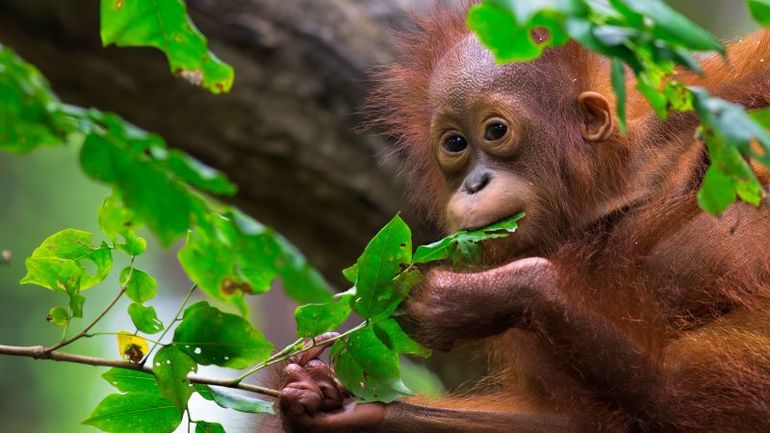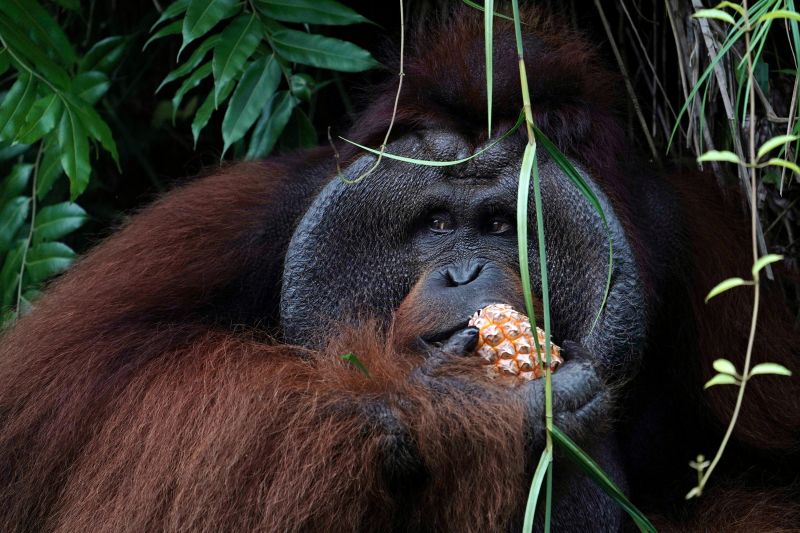
Malaysia's Orangutan Ambassador Program Sparks Controversy

Just like China's 'panda diplomacy' and Australia's koala parades, Malaysia is embarking on a new initiative to use orangutans as ambassadors. The country's plan to gift orangutans to palm oil buyers in the Asia-Pacific region has stirred up debate and criticism, with some calling it 'obscene.'
Malaysia is looking to adopt a new trend in Asia-Pacific by sending orangutans as gifts to countries that purchase its palm oil. This move is similar to China's "panda diplomacy" and Australia's showcasing of koalas at global summits.
However, this idea has faced backlash from conservationists. They point out that palm oil production is a major contributor to the declining population of orangutans. In fact, a prominent conservation professor has criticized the plan, calling it "obscene."
Palm oil is a popular vegetable oil that is used in a wide range of products, including shampoo, soaps, and ice cream. Unfortunately, the clearing of land for palm oil plantations has contributed significantly to deforestation, posing a serious threat to the survival of critically endangered orangutans.
Malaysia holds the title of being the world's second-largest exporter of palm oil, following Indonesia.
Production plays a crucial role in the economy. In recent years, government officials have made efforts to protect and promote the industry. They have introduced initiatives to promote sustainability, such as enhancing agricultural practices and awarding green certificates to companies that meet sustainability criteria.
Active self‑treatment of a facial wound with a biologically active plant by a male Sumatran orangutan.
Active self‑treatment of a facial wound with a biologically active plant by a male Sumatran orangutan.
Armas
Related article
Orangutan observed treating wound using medicinal plant in world first
At a biodiversity summit near Kuala Lumpur, Malaysia's minister for plantations and commodities introduced plans for "orangutan diplomacy." Inspired by Chinese panda diplomacy, where China builds relationships by loaning pandas to overseas zoos, Malaysia aims to give orangutans to key trading partners.
Minister Johari Abdul Ghani explained that these partners, particularly in major importing countries like the EU, India, and China, are worried about the environmental impact of agricultural commodities. Orangutan diplomacy is seen as a strategic move to strengthen relationships and benefit trading partners and foreign relations.
Ghani did not share specific details about when or how the animals would be obtained. However, he encouraged palm oil companies to work together with local environmental organizations to protect the endangered orangutans.
He expressed that this partnership would demonstrate Malaysia's commitment to wildlife conservation and the preservation of our forests, particularly within the palm oil industry.
Halved oil palm kernels are seen on the trade floor of a commodities conference and exhibition in Kuala Lumpur.
Halved oil palm kernels are seen on the trade floor of a commodities conference and exhibition in Kuala Lumpur.
Conservationists quickly criticized the announcement, expressing their strong disapproval. Stuart Pimm, who chairs conservation ecology at Duke University, described the decision as "obscene, repugnant, and extraordinarily hypocritical." He stated that destroying rainforests where orangutans live, capturing them, and then giving them as gifts to gain favor with other nations is completely contrary to how we should be protecting these animals and our planet.
Pimm pointed out that after using cute animals to charm people, there are usually broader conservation efforts that follow.
He explained, "China's approach to protecting giant pandas is much more advanced compared to Malaysia's plans. China not only has top-notch facilities for pandas, but also has designated protected areas to ensure the safety of wild panda populations. Malaysia's proposals are not at the same level as China's efforts."
CNN has contacted Ghani and Malaysia’s Ministry of Plantation and Commodities for more information on the orangutan program and how they will ensure its support for conservation and sustainability.
A panda basks in the sun at the Chengdu Research Base of Giant Panda Breeding.
A panda basks in the sun at the Chengdu Research Base of Giant Panda Breeding.
VCG/Visual China Group/Getty Images
Environmental and conservation groups were against the idea, urging Malaysian officials to focus on reducing deforestation rates, which are mostly caused by palm oil.
According to a 2022 report by the World Wildlife Fund (WWF), between 2001 and 2019, Malaysia lost over 8 million hectares (19 million acres) of tree cover, an area almost the size of South Carolina.
Malaysia used to have a lot of forests covering its land, as mentioned in a report by the WWF. The report also highlighted ongoing risks like palm oil farming and harmful logging practices.
A recent report from Rimba Watch revealed that an additional 2.3 million hectares of forests in Malaysia are planned to be converted for palm oil production in 2023.
"According to Heng Kiah Chun, a regional campaign strategist for Greenpeace Southeast Asia, relying on orangutan diplomacy will not be enough to address Malaysia's deforestation crisis. Instead, he believes that the Malaysian government needs to take action by implementing policies to combat deforestation if they are truly dedicated to biodiversity conservation."
Orangutan observed treating wound using medicinal plant in world first
03:29
- Source:
CNN
Conservation ‘crucial’
Orangutans are the largest tree-dwelling animals, known to spend most of their lives swinging through canopies of tropical rainforests.
Researchers have observed the remarkable intelligence of certain animals. These creatures have shown impressive abilities, like using medicinal herbs to treat wounds or using tools made from natural materials to crack open nuts.
An orangutan eats a pineapple at the Samboja Lodge eco-tourism resort, operated by the Borneo Orangutan Survival Foundation (BOS), in East Kalimantan, Borneo, Indonesia, on Monday, Nov. 25, 2019. For Jakarta, a city on the island of Java saddled with some of the worst superlatives in the regionmost polluted, most congested, fastest sinkingthe floods were an old story, the third time deluges have killed dozens since 2007. The problems have become so overwhelming that, even before the latest catastrophe, President Joko Widodo had decided to build a new capital 1,200 kilometers away on the island of Borneo. Photographer: Dimas Ardian/Bloomberg via Getty Images
An orangutan enjoys a pineapple at the Samboja Lodge eco-tourism resort in East Kalimantan, Borneo, Indonesia, on Monday, Nov. 25, 2019. The resort is operated by the Borneo Orangutan Survival Foundation (BOS).
In Jakarta, a city located on the island of Java, facing some of the worst challenges in the region like pollution, congestion, and sinking land, flooding has sadly become a common occurrence. This recent flood marked the third time since 2007 that floods have claimed the lives of dozens of people.
The issues in Jakarta have become so severe that even before this latest disaster, President Joko Widodo had made the decision to establish a new capital city on the island of Borneo, located 1,200 kilometers away.
The photograph capturing the orangutan and the pineapple was taken by Dimas Ardian and published by Bloomberg via Getty Images.
Related article
Indonesia’s new forest capital in Borneo heightens fears for orangutans’ future
The gentle apes, once abundant in Southeast Asia, have seen a significant decrease in their population, as reported by WWF Malaysia. This decline is particularly evident on Borneo, the large island shared by Malaysia, Indonesia, and Brunei. In 1973, Borneo was home to an estimated 288,500 orangutans. However, by 2012, their numbers had plummeted by almost two-thirds to 104,700, and this downward trend has persisted.
According to the WWF report, it is estimated that there are still around 100,000 orangutans remaining on Borneo, and 14,000 on the island of Sumatra in Indonesia.
Orangutans are in critical danger, so it is important to protect their habitats, as stated by WWF Malaysia in an interview with CNN. WWF Malaysia also emphasized that a focus on better forest management and sustainable palm oil production would demonstrate Malaysia's dedication to conserving biodiversity.
“Orangutan conservation is best achieved by ensuring the protection and conservation of their natural habitats – and that no further forest conversion into palm oil plantations is allowed.”
Editor's P/S:
The proposed "orangutan diplomacy" by Malaysia has sparked a heated debate, exposing the complex relationship between conservation and economic growth. While the government aims to strengthen international relations and promote sustainable palm oil production, conservationists rightfully raise concerns about the welfare of orangutans and the continued destruction of their habitats.
It is crucial to recognize that palm oil production has had a devastating impact on orangutan populations. The conversion of forests into plantations has fragmented their habitats, reduced their food sources, and increased their vulnerability to poaching. Giving orangutans as gifts, while seemingly a symbolic gesture, does not address the underlying issue of deforestation and habitat loss. Instead, it risks further exploiting these endangered animals for political gain. To truly protect orangutans, Malaysia must prioritize sustainable palm oil practices, implement strict forest conservation policies, and work with local communities to find alternative livelihoods that do not rely on deforestation.










